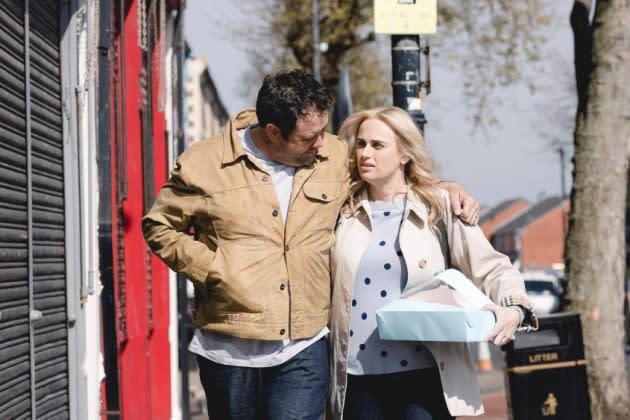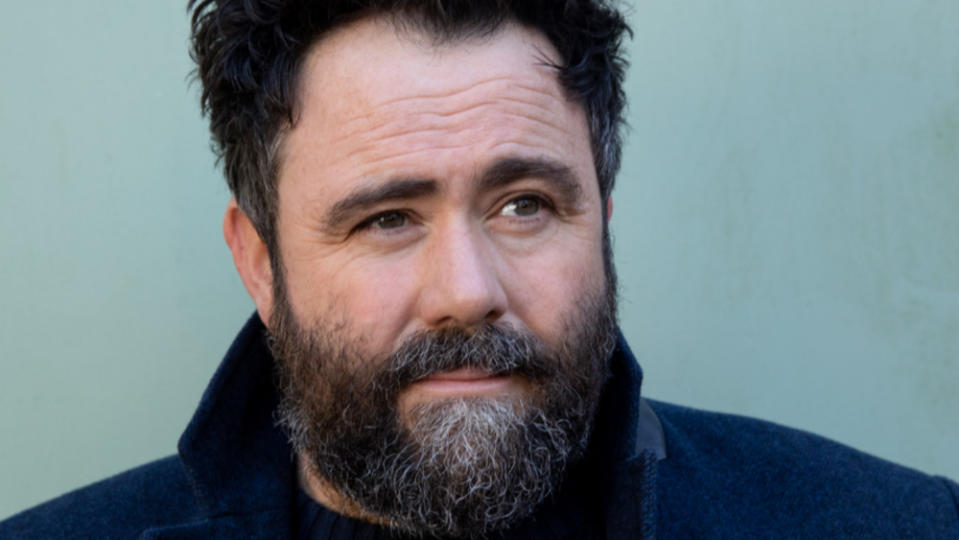‘The Almond and the Seahorse’ Auteur Celyn Jones Talks Welsh Pride and Directing Rebel Wilson in Her First Dramatic Role

Actor, writer and director Celyn Jones (pictured above, left, and below) is the triple threat no one saw coming. Originally from Wales, where he still films a lot of his projects, Jones built his career first as an actor of both theater and screen before pivoting to writing features such as “Set Fire to the Stars,” which starred Elijah Wood, “The Vanishing” featuring Gerard Butler and “Six Minutes to Midnight,” which he co-wrote with Eddie Izzard co-wrote and stars both Izzard and Judi Dench.
Jones’ latest project, “The Almond and the Seahorse,” also represents his directorial feature debut. Jones co-wrote the film, which is about two couples dealing with traumatic brain injuries, with Kaite O’Reilly (on whose play it is based) and co-directs with Tom Stern (“Changeling”). He also stars in it alongside Charlotte Gainsbourg (“Melancholia”), Trine Dyrholm (“Queen of Hearts”), Meera Syal (“Yesterday”) and Rebel Wilson (“Pitch Perfect”). The film, which premieres at the Zurich Film Festival on Monday evening (Sept. 26) also represents a significant first for Wilson as it is the first time she appears in a dramatic role.
More from Variety
Oscar-Winning Composer Rachel Portman on Sound of Antoine Fuqua's 'King Shaka'
'The Kings of the World,' 'Stuntwomen' Triumph at Zurich Film Festival
Shortly before flying to Zurich, where Jones will appear with the cast and creative team in person, he sat down to speak to Variety about adapting “The Almond and the Seahorse” from a play into a feature, working with Wilson and the Welsh production boom.
How did this project come about?
Well, “The Almond and the Seahorse” is the name of a play written by Kate O’Reilly. I was in the original production in 2008 [at the Sherman Theatre in Cardiff, Wales] and the part [of Joe, which Jones reprises in the film] was written for me. [The play] had a great, great critical reception. And it never left me, the idea of the audience’s reaction. People laughing and crying and having this human connection and the idea of the fragility of life and the robustness of life. And the idea that heartbreak and “brain-break” are two very different things but affect everybody. So I just wasn’t done [with it]. I just thought it was a great story, great characters, I loved playing that character. And that was always in the back of my mind. It never really had its day, never really had the chance that it deserved. And then when I started working in independent film on this side of my career, probably about six years ago now, Kate got in touch and said “Do you fancy adapting ‘The Almond and the Seahorse’ together?” And I thought, “Yeah, I love the play.” It was unfinished business.

How did Rebel get involved?
Her agent had read the script and really loved [it] and said, “What do you think of Rebel Wilson?” And at that point, I think they were thinking, “Well, what, do you think of Rebel Wilson?” as if to sort of [be] testing [our reaction], but immediately I thought, “Well, I think Rebel’s great.” I [thought] we would be great together as a pair and this character is so strong and unique that you really need to love Sarah throughout this film because she really goes through the wringer as a character. She’s a an archaeologist that’s trapped in the past, like Charlotte Gainsbourg an architect is trapped in the house, and whereas Trine Dyrholm and myself, we are characters who have had traumatic brain injury. But the thrust of the story is about the people who don’t have it and how they survive. It’s the aftermath of it. We’re looking at the people without the condition and how they have to piece together their life like broken pieces of a vase. So the idea of Rebel coming to this film was like, people instantly love her and root for her as a person. So, that character could be as abrasive, as flippant, as despondent, you know, as kind, as caring, as funny as Rebel – as we – wanted it to be because we were with her.
She read it and two days later she was in. All of a sudden, Rebel Wilson’s in a film opposite Charlotte Gainsbourg. It’s like a pairing nobody knew they wanted until they see it.
How are you feeling about the film premiering at Zurich?
Well, I guess it’s out of my hands, you know. I’ve been in films that have romped into festivals and limped out. And I’ve been in films that have limped into festivals and romped out, you’re not in control of any of it. You just want people to enjoy it, you want a good house, and you want the audience to enjoy it. In terms of critical response, who knows, but the work is authentic and it’s committed and these actors have never been in the same sort of film before.
Am I nervous? I guess I’m just not in control of it. I just want people to enjoy it. A lot of people worked really, really hard to get it there. It should be a moment of celebration and joy and the rest is up to the universe. But the film is a good cry, a healthy cry. And I think the story has set a satisfactory end.
And like I said, I think the world is gonna see Rebel in a way that they haven’t seen her before and supported by Trine and Charlotte, extraordinary actresses.
Part of “The Almond and the Seahorse” was shot in Wrexham, Wales. Between “His Dark Materials,” “Doctor Who” and Ryan Reynolds’ “Welcome to Wrexham” shooting in Wales, it seems the country is enjoying quite a production boom.
Yeah, I’m an ambassador for the Into Film charity and my running joke is that generations to come will say – where they used to say, “You’re going to work down the [coal] mines” – they’ll [now] say, “I’m going to work down the studios.” But I think that’s wonderful that it is a viable industry and that’s something I’m very, very passionate about, that it is a thriving and viable industry with a myriad of jobs and opportunities for people. “Set Fire to the Stars” we made for half a million quid [$546,000] in Swansea with Elijah Wood and it was just the beginnings of this kind of [renaissance of Welsh production] and since then all these amazing things have been happening in Wales. Obviously, “Doctor Who” was the big kicker for the world stage taking note [of] things happening in Wales.
But just from our point of view as a production company, I love the fact we brought Elijah Wood to Swansea and Judi Dench to Llanelli and Eddie Izzard to Llandudno and Rebel Wilson to Wrexham.
What would be your dream project?
I get really inspired by lots of different things. I want to create for lots of different actors and tell lots of different types of stories. So I like to do something kind of audience-facing that is very characterful, and with something to say at its heart, but in terms of genre, I’m open to [all of] it, and also open to actors, because I’ve got a long list of actors in my head that I go, “I’d love to see that person in that type of story.” Isn’t it wonderful that a blank piece of paper can become an opportunity and jobs for people, and then that can become a film that can then be enjoyed. That’s the magic to me.
This interview has been edited for length and clarity.
Best of Variety
Sign up for Variety’s Newsletter. For the latest news, follow us on Facebook, Twitter, and Instagram.

 Yahoo News
Yahoo News 
